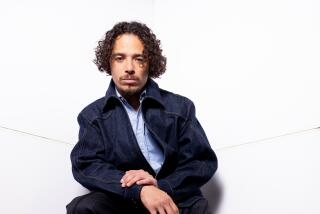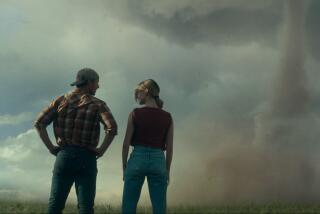Listen to the Wind, Hear the Creator
Natural disasters always make me feel religious. Even more than a spectacular sunset or a white-starred night, they remind me of how small we all are, as though God is giving Job a refresher course: âWhere were you,â Job is asked, âwhen I laid the earthâs foundations? ... Who set its cornerstone? ... Who closed the sea behind doors when it gushed forth out of the womb, when I clothed it in clouds, swaddled it in dense clouds, when I made breakers my limit for it, and set up its bar and doors, and said, âYou may come so far and no farther; here your surging waves will stopâ?â
I have been watching the great gushing of dry streambeds, and the pouring out of rivers over neighborhoods and roofs. Everywhere, the West is murky green, its waters uncontained, its irrigating rivers forming great flat fields of gray where barns, homes, orchards, highways stood. Even in L.A. we feel it, in rain supplanted now by wind that tosses trees into childrenâs bedrooms. And through it all, in my yard, new pear tree blossoms cling sturdily to their branches, undeterred by tempest far or near.
Itâs a day for awe, as at a time of death or a birth in the family, humility comes easier. Itâs the kind of day God offers us, perhaps, just partly as a present, to open up our hearts and loosen up our prayers.
Humility is an absolute prerequisite to prayer, and neither prayer nor humility comes easy to the late 20th century. So much we have conquered! The moon, smallpox, the depths of the ocean. We have flown right through those swaddling clouds; we have built walls to harness the rivers and channeled their power for our street lights and computers.
On the one hand, we see what we have accomplished as proof that there is no consciousness higher than our own; on the other, faced with what we ourselves cannot conquer--grave illness, accidents, great evil--we are sure that no higher being would have ordered it. Human power and attainment are the ultimate. âSing to man,â we could say, paraphrasing the psalm, âa new song. Play sweetly with shouts of joy, for the word of man is right!â--or, in the words of a tape someone gave my kids, âWeâve got the whole world in our hands!â
Sounds a little hollow before an avalanche of foam pounding over a highway bridge or sturdy hillside houses crushed beneath great waves of mud. No, faced with extremism in nature, it is God who appears before us because we are humbled by the scene. When we cry out of the depths of our hearts, we know instinctively that no human can answer us. That is why everyone prays, almost involuntarily, when theyâre afraid their plane might crash, or when a loved one is ill, or when they first fall in love.
And yet, knowing God does not diminish human accomplishment at all, or make scientific exploration less inviting. Vice President Al Gore, of all people, explains this so beautifully in his book, âEarth in the Balance,â in which he credits monotheism with making science possible. âFor those who came to believe in a single Creator,â Gore writes, âthere was no longer any reason to imagine that each object and living thing had a unique spiritual force and that each was imbued with mysterious meaning and motivated by unknown powers. .J.J. Just as a navigator can--through the technique of triangulation--locate his position anywhere at sea by identifying any two other points with known locations, like familiar stars and constellations, those who came to believe in a single God gained the intellectual power to navigate skillfully through the ocean of superstition and bewilderment that engulfed the ancient world. Whatever these monotheists beheld could be philosophically located with reference to two known points: the Creator, philosophically equidistant from everything he had created, and themselves.â
An ironic but compelling view: that the great humility of knowing one God and our own minuscule place in (his) universe unleashed our greatest achievements and discoveries. Most religious people will tell you something similar: that faith empowers them, to work, to create, to love, to reach out toward others more than they thought they could. What, then, empowers faith? Among other things, humility; so whatever makes us feel small--a birth, say, or a death or a natural disaster--will help.
So I see God, always a welcome sight, in the New Yearâs storms. It annoys me that he is harder to find on ordinary days, but for âspiritual triangulationâ I use a prayer book; there is God, there is me, and there is the particular feeling of a given prayer. Here the unknown quantity is me; where am I? Is this the prayer that will catch me today and bring me into the holy presence? I try until, usually, I find one. Some days all doors seem closed. But not stormy days.
âHear please, and I will speak,â Job replies. âI will ask, and you will inform me. I had heard you with my ears, but now I see you with my eyes.â And so television, manâs creating, opens our eyes, and we can see great cataclysms miles away, and our prayers are lifted farther than the clouds, on wings made not of aluminum. Unleash the sea, open the doors; tell me again that I am, like Job, âbut dust and ashes.â Then watch me sandbag my neighborâs house, pack lunches for the victims, bring blankets to a shelter, hug my children, check on seldom-called loved ones on the phone. Watch us, as we Americans always do at these times, fill our hours with holy deeds, our hearts flooded, clinging to your branches like new blossoms, fragile and renewed.






